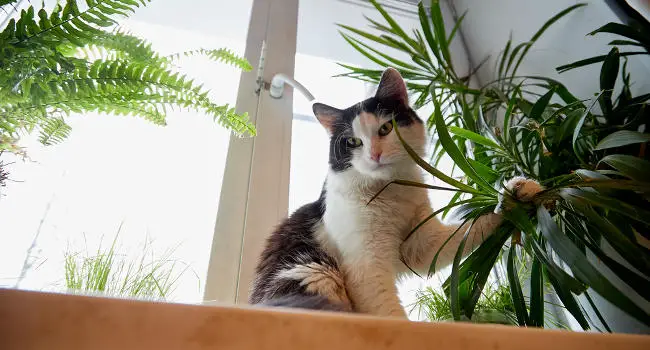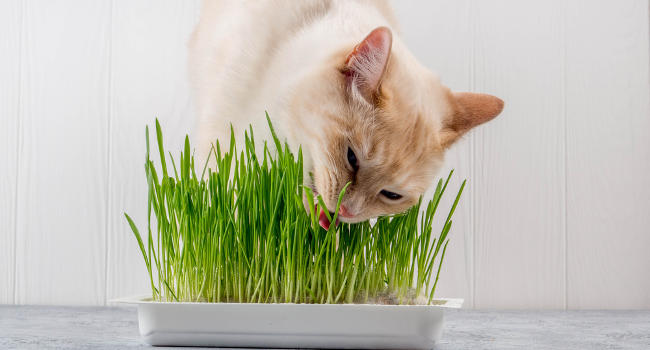How to Keep Cats from Eating Houseplants

As a cat parent, you might have noticed that your furry feline friend and your plants do not get along very well. You love them both but your cat is all set to wage a war against your houseplants.
Why do cats chew on plants? How can you save your plants from being your cat’s favorite chew toy? Continue reading to find out!
Why Cats Chew on Plants
Cats are not omnivores like us. They are obligate carnivores who get their nutrition from meat. Their digestive system is not designed to process enzymes that they take in from plants. While their bodies can handle plant-based nutrients in small quantities, larger amounts of nutrients consumed from plants can harm your kitty seriously.
Then why do your cats attack your houseplants like the plants are their mortal enemies? The answer is ridiculously simple. Curiosity!
Yes, you read that right. Cats are highly curious beings. They are bound to explore their surroundings nose first! Since they see plants around them all the time, they are going to experiment with it. It is like you trying out that new restaurant where you are never sure of the cuisine.
You have also noticed how excited your furry friend gets when you bring out his favorite feather toy or laser pointer. They could be just as stimulated by the moving leaves of your houseplant. It is a call for attention that they are bored with their surroundings.
However, if you observe your cat eating your plants regularly and also notice a change in his/ her appetite, it is better you consult your vet immediately. Like any other animal in the wild, cats have the instinctive knowledge to chew on grass or specific plants when they are in digestive distress. It could be something as simple as constipation or as worrying as intestinal parasites. In either case, it is best to schedule a visit with your vet as early as possible.
How to Safeguard Your Plants

Now that you know the reasons why your cat is going armageddon on your plants, let us take a look at the things you should do to protect your plants and keep your cat away from them.
Plants have the ability to make your home feel more welcome. There are huge health benefits too. Plants can detoxify the air around and increase the flow of oxygen in your home. Some plants can also ward your space against pests and parasites that spread diseases. And, if we are being honest, houseplants are not always cheap and there is a lot of emotional investment that goes into maintaining them.
We have put together a bunch of suggestions that you can try to keep your plants safe. Your plants and your feline friend need not be mutually exclusive.
Location Matters
This is probably the most obvious thing you need to consider. Place your plants away from your feline’s reach.
But you have to take into account that cats are agile climbers and they are typically not scared of heights. So just a top-shelf might not do the trick if your furry friend is hellbent on destroying your plant.
Hanging pots, however, can be a great solution. All you need to do is make sure that your cat cannot jump on it from any possible access point. Do not forget to water them though!
Another possibility is to keep them in a location at your home that is out of bounds to your cat. This can be a little tricky because you never know what your little mischief maker is up to when you are not at home.
You can also consider using cages; not to imprison your cat but to preserve your plants. You can safely lock your plants in wired cages so your cat cannot get its paws on them. An open wired cage will also ensure your plants get sufficient amounts of heat and light.
Giving into Grass Cravings
Sometimes, you have got to steer into the skid! We all know you spoil your furry prince or princess anyway. If your cat is repeatedly chewing on your houseplants, give him/her cat grass so he/she leaves the rest of your plants alone.
Research shows that cats have a tendency to chew on grass even if they do not consume them. Lawns outside can be risky because of pesticides that might be sprayed upon it. Other plants can also cause a negative reaction in your cat.
So, instead of taking these risks, you can plant your own cat grass that your friend can happily chew on. Cat grass is grown from rye, barley or oats and is incredibly simple to plant. Moisten the seeds and put them in soil. They usually sprout within a week. Spray them with water occasionally and let your cat go to town on it.
Your other plants will remain safe.
Daily Distractions
As observed earlier, cats are highly curious beings. Your cat could have set your plants as targets simply because they have nothing else to do.
Felines are also natural hunters. It is coded in their DNA and no amount of domestication can completely erase it from their system. The leaves that gently flutter in the wind are worthy opponents for your cat to conquer.
You can easily take care of this psychological need by providing them with other distractions. Consider investing in some cat toys, a scratching post and a few cardboard boxes to keep your cat away from your plants.
Repellent Sprays
Cat repellant sprays are another way to go. You have lots of choices available in the market. They are made out of non-toxic chemicals that will not cause harm to your plants or your pets. Simply spray them around your plants and the odor will ensure your cats stay away from them. Don’t worry, the smell is unpleasant only to cats, not to humans.
If you are wary of the over-the-counter repellents, you can always custom make yours at home using one part vinegar and one part water. Spray it occasionally in the soil and your cats will definitely leave your plants alone.
Booby Trap Your Plants
There are a few ways of doing this so your cats learn to stay away.
One of the easier options is to sow plants that cats generally hate. Rosemary is one such plant. We might love the smell of it but cats would vehemently disagree.
Another option is to go for ones with thorns. One encounter with a cactus or a rose bush, your cat is going to avoid your plants like the plague.
Cats also tend to stay away from the smell of anything citrus. Even if you are not going to plant lemon or orange saplings inside your home, you can always mix lemon or orange peel with the soil. Their sensitive noses would definitely pick up the scent. It will also ensure that your cat does not mistake the planter for its litter box.
The second option is to surround your plants with things that annoy your cat. Tinfoil could do the trick. Or anything your cat dislikes. It would provide another layer of protection to your plants.
You could also build a small fence for your plants that will irritate and deter your cats away from them.
The third option is to cover the soil with pine cones or balled-up aluminum foil so your cat cannot dig up the pot.
The fourth option is to strategically place a martyr plant. The one plant your cat will go to, leaving the rest of them alone. Catnip would be the best choice, of course.
The last choice here is to set up a sprinkler system that your cat can trip when it gets too close to the plants.
Cat Conditioning
While we all know cats cannot be trained as easily as dogs, there are certain behaviors they can be conditioned to learn.
Every time you see your cat heading towards your plants, distract him/ her using toys or by firmly calling out his/ her name. You can also try this with “No”. Give him/ her a treat for following your instruction. When this pattern is repeated often, they will learn that the plants are off limits.
Spraying them with water is a technique that is often suggested when you are training your pets. We would suggest keeping this as a last resort because we do not want your cat to identify you as the punisher.
Choosing Plants Carefully
One or a combination of these methods will certainly help you to keep your cat away from your plants. But to stay on the side of caution, it is better to avoid plants that are highly toxic to cats. It is a small sacrifice you will be making in order to balance both your loves!
Having said that, remember your cat is a curious being and would want to explore every part of your home. But by using any of the suggestions mentioned above, you can ensure that your cat and your plants live harmoniously together.
